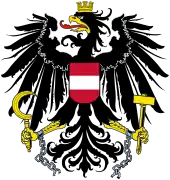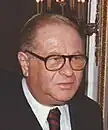| |||||||||||||||||||||||||||||||||||||
165 seats in the National Council of Austria 83 seats needed for a majority | |||||||||||||||||||||||||||||||||||||
|---|---|---|---|---|---|---|---|---|---|---|---|---|---|---|---|---|---|---|---|---|---|---|---|---|---|---|---|---|---|---|---|---|---|---|---|---|---|
| |||||||||||||||||||||||||||||||||||||
 Results of the election, showing seats won by constituency and nationwide. Constituencies are shaded according to the first-place party. | |||||||||||||||||||||||||||||||||||||
| |||||||||||||||||||||||||||||||||||||
| This article is part of a series on the |
| Politics of Austria |
|---|
 |
Parliamentary elections were held in Austria on 1 March 1970.[1] The result was a victory for the Socialist Party, which won 81 of the 165 seats to become the largest party for the first time in the Second Republic. With the SPÖ two seats short of a majority, SPÖ leader Bruno Kreisky became Chancellor at the head of a minority government that was tolerated by the Freedom Party of Austria in return for electoral reforms that benefitted smaller parties by increasing the proportionality of votes and seats.[2] Voter turnout was 91.8%.[3] It was the first Socialist-led government since 1920, and the first purely left-wing government in Austrian history. The SPÖ would lead the government for the next 29 years.
Early elections under the new system were held the following year, at which the Socialists won an outright majority.
Results
 | |||||
|---|---|---|---|---|---|
| Party | Votes | % | Seats | +/– | |
| Socialist Party of Austria | 2,221,981 | 48.42 | 81 | +7 | |
| Austrian People's Party | 2,051,012 | 44.69 | 78 | –7 | |
| Freedom Party of Austria | 253,425 | 5.52 | 6 | 0 | |
| Communist Party of Austria | 44,750 | 0.98 | 0 | 0 | |
| Democratic Progressive Party | 14,925 | 0.33 | 0 | 0 | |
| National Democratic Party | 2,631 | 0.06 | 0 | New | |
| Adolf Glantschnig – For Humanity, Law and Freedom in Austria | 237 | 0.01 | 0 | New | |
| Total | 4,588,961 | 100.00 | 165 | 0 | |
| Valid votes | 4,588,961 | 99.10 | |||
| Invalid/blank votes | 41,890 | 0.90 | |||
| Total votes | 4,630,851 | 100.00 | |||
| Registered voters/turnout | 5,045,841 | 91.78 | |||
| Source: Nohlen & Stöver | |||||
References
- ↑ Dieter Nohlen & Philip Stöver (2010) Elections in Europe: A data handbook, p196 ISBN 978-3-8329-5609-7
- ↑ Nohlen & Stöver, p188
- ↑ Nohlen & Stöver, p215




